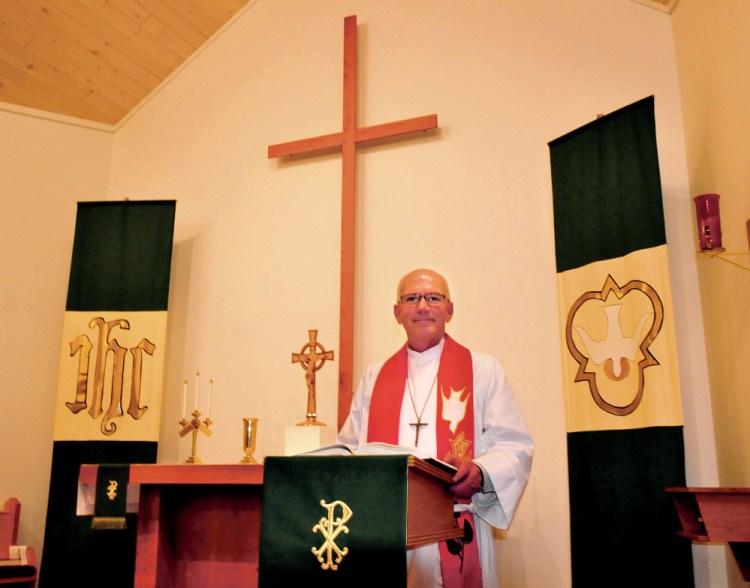WATERVILLE — Martin Luther came “Out of love for the truth and the desire to bring it to light” on Oct. 31, 1517, in the opening line of his “95 Theses,” a document challenging theological beliefs and practices of the Roman Catholic Church, which, tradition tells us, he nailed to the door of a church in Wittenberg, Germany.
This “protest” of Catholic church policy, including the role of the pope in Rome and practices regarding penance and indulgences — the ability to buy one’s way out of sin — began the Reformation, the Protestant movement in the Christian church that changed Western society forever.
On Sunday two observances are scheduled for the 500th anniversary of Luther’s act and the start of the Reformation.
The Lutheran Church of the Resurrection, at 36 Cool St., Waterville, will conduct a special worship service beginning at 10 a.m. Sunday, to be followed by a performance by a brass quartet, Lutheran hymns and a German-style banquet, including bratwurst, German potato salad, spätzle, pretzels and dessert. The public is invited to attend the service and banquet.
Meanwhile, at Lorimer Chapel, at Colby College, a “Bringing the ‘Protest’ Back to Protestantism” event is planned for 11 a.m. Sunday at the chapel.
The service will feature visiting gospel musicians David Dupree, of Washington, D.C., and David Powell, of Princeton N.J., returning to Colby for their second gospel residency. Area residents interested in singing are welcome to a daylong rehearsal Saturday.
The Sunday service is sponsored by the Colby Office of Religious & Spiritual Life, the Pugh Center, Students Organized for Black and Latin Unity, Waterville United Church of Christ, Pleasant St. Methodist Church, St. Mark’s Episcopal Church and Winslow Congregational Church.
The event is being organized by Kurt Nelson, Colby’s dean of religious and spiritual life; and the day’s word will be offered by the Rev. Dr. Cheryl Townsend Gilkes, MacArthur Professor of African-American Studies and Sociology.
Shuttle rides will be offered to Lorimer Chapel from Colby’s Eustis Parking lot, and the event is free and open to the public.
Contacted by phone Thursday, Nelson said going to the root of the word “protest” and Protestant has deep meaning in today’s political climate.
“It’s a historical reminder that Luther’s act, so the story goes, was an act of protest, and that spirit of protest has been an important part of our churches for a long time — all the way up through the civil rights movement and hopefully continuing into today as we think about all the places we need to be working for justice and to show God’s love in the world,” Nelson said.
He said that bringing in historical tradition, gospel artists and the role of spirituals and music in protest movements is significant history in its own right and inspires thoughts of “where the broader church needs to be working today in thinking about justice for everyone, right now, here and now.”
The Rev. Paul Nielsen at the Lutheran church on Cool Street said the Reformation was primarily a return to “the primacy of God’s word,” versus the primacy of the people who ran the church, with the voice of the Catholic church speaking through the pope.
“When Luther composed the ’95 Theses,’ he had no intention, whatsoever, of splitting the church,” Nielsen said by phone Thursday. He said Luther thought a formal debate was needed to discuss, among other things, the sacrament of penance and the place of indulgences in the sacrament.
In the Catholic church, penance meant confession of sin, followed by the forgiveness of the sin — a continuation of what Baptism began, Nielsen said. After Baptism, when a person sins again, penance takes over, involving an act of punishment — which is up to the priest to administer with orders of prayers.
In the Lutheran Reformation, he said, baptism is all one needs for salvation.
“For Lutherans, baptism does everything,” he said. “And when you sin after baptism, you simply return to your baptism. There is no work that you do in order to finish baptism. Baptism is a finished product. It’s a done deal — no penance to do.”
Indulgences became a practice in which the punishment part of penance could be eliminated. Over time, especially during the medieval period, indulgences were something a sinner could pay for and became “a lucrative part” of the church budget.
“According to Luther, they (indulgences) interfere with what the sacrament of penance was meant for,” Nielsen said. “The ’95 Theses’ outlines his objections to the church’s practice, but he does so to reform the church, not to break away from it.”
Doug Harlow — 612-2367
Twitter:@Doug_Harlow
Send questions/comments to the editors.




Comments are no longer available on this story